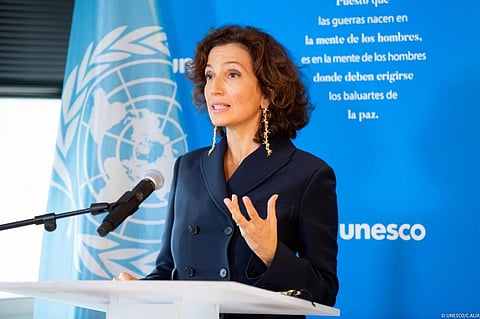

Two billion people (26 per cent of the population) do not have access to safe drinking water, according to a new report released by UNESCO at the start of the UN 2023 Water Conference in New York City on March 22.
As many as 3.6 billion (46 per cent of the global population) lack access to safely managed sanitation, the report added.
“Between two and three billion people experience water shortages for at least one month per year, posing severe risks to livelihoods, notably through food security and access to electricity,” the document read.
The global urban population facing water scarcity is projected to double from 930 million in 2016 to 1.7-2.4 billion people in 2050, the report went on to elaborate.
It also stressed that growing incidence of extreme and prolonged droughts is also stressing ecosystems, with dire consequences for both plant and animal species.
For instance, the ongoing drought in Somalia, Africa has caused more deaths in 2022 than in the first year of the 2017/2018 drought crisis.
“There is an urgent need to establish strong international mechanisms to prevent the global water crisis from spiralling out of control,” said Audrey Azoulay, UNESCO Director-General.
“Water is our common future and it is essential to act together to share it equitably and manage it sustainably,” she added.
Gilbert F Houngbo, chair of UN-Water and director-general of the International Labour Organization said: “There is much to do and time is not on our side”.
The document said cooperation across borders was key to ensuring universal access to safe drinking water.
This was because nearly every water-related intervention involves some kind of cooperation. Occurring across local to global scales, through formal and informal arrangements, water partnerships bring together different stakeholders with varying objectives and perspectives.
“Cooperation is critical to achieving all water-related goals and targets. Any ‘acceleration’ of progress towards the sixth Sustainable Development Goal (SDG 6) depends heavily on the efficient and productive performance of partnerships,” the report said.
It said there was “increasing attention to the role and contributions of local and indigenous communities in effective partnerships, taking account of their knowledge and unique perspectives”.
Full and effective involvement of women in partnerships greatly improves the design, impact and delivery of targeted water, sanitation and hygiene (WASH) services and broader water-related goals.
The report concluded that potential impediments to cooperation need to be identified, acknowledged and avoided. For instance, unclear and / or overlapping mandates among partners can lead to confusion and the duplication of efforts, and seed internal competition.
The analysis urged boosting international cooperation over how water is used and managed. “This is the only way to prevent a global water crisis in the coming decades,” it warned.